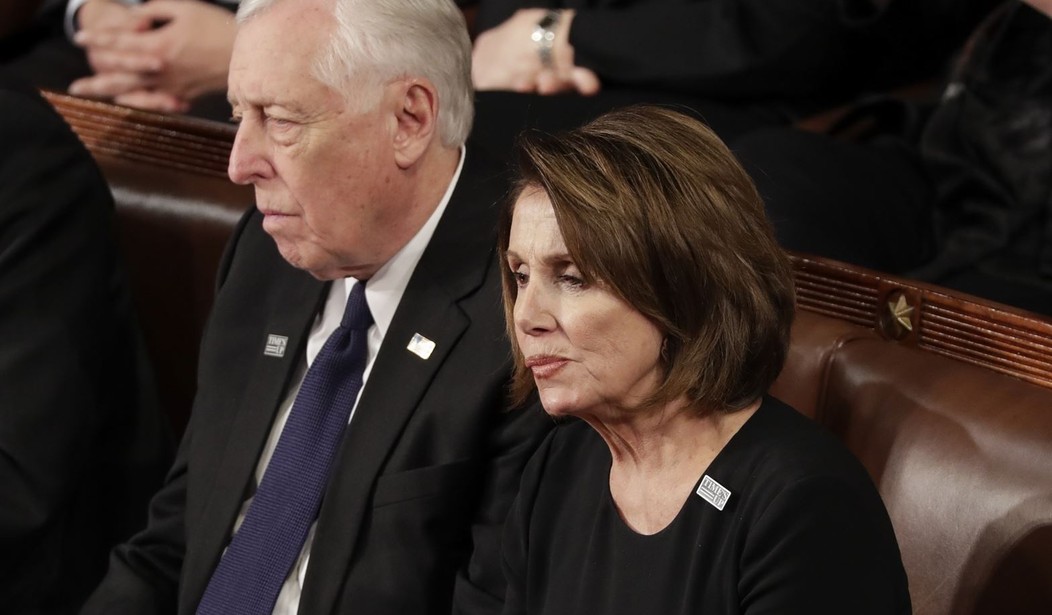Regular readers are aware that I've been relatively bearish in my analysis of Republicans' midterm prospects, a skeptical posture that I still hold, due to historical trends (including 1994 and 2010) and Trump-era electoral outcomes. Nevertheless, my mind is open to the possibility that the so-called blue wave never materializes -- at least not to the significant magnitude that many have been forecasting. A number of smart election watchers have chimed in on this topic in recent days and posited that perhaps the Congressional GOP is in a stronger position than the conventional wisdom suggests. Left-leaning number-cruncher Harry Enten looks at the data and envisions a plausible scenario in which Republicans lose ground, but don't lose the House:
While Democrats are favored to take back the House, it's by no means a certain proposition. Right now, Democrats hold somewhere in the area of a seven-point lead in generic congressional ballot polling over the last two months. Based upon movement in the generic ballot in midterm campaigns from this point in the cycle to the election since 1938, we'd expect the margin to remain roughly the same on Election Day 2018 (Democrats +7). A seven-point lead for the Democrats on the generic congressional ballot is far from a guarantee that they'd take back the House. In fact, my estimate based upon on how district lines are drawn suggest that Democrats would probably be a 50:50 proposition of gaining enough seats (23) to take back the House, if they won the national House vote by 7 percentage points...
Now, it is true that Republicans are faring far worse in special congressional elections than you might expect in an environment in which they were down only 7 points on the generic congressional ballot. They have been outperforming the average partisan lean of the districts and states involved in special congressional elections by an astounding 17 percentage points. And as I have pointed out over and over again, there has been a clear correlation between special election results in midterm cycles and the House popular vote since 1994. Yet, keep in mind the sample size we're dealing with in special elections: nine. Although the signal from those nine has been fairly clear, nine elections is still a relatively small sample size. We're also only looking at races without incumbents when examining special elections. We know from history that incumbents tend to do better than the partisan lean of a district would suggest. About 80% of all Republican held seats up for grabs this fall will feature incumbents.
Recommended
Enten also runs through some numbers coming out of a Democratic polling firm -- using non-gold standard methods, as he calls them -- which produced decent-but-somewhat-underwhelming results: "Democrats were only outperforming the partisan lean in these districts by 6 points -- significantly less than the special elections would indicate. That's not an awful result for Democrats given how powerful incumbency can be but given that these polls were released by a Democratic-leaning organization, it wouldn't surprise me if Republicans were in a bit better position in reality than these numbers showed. Indeed, the last time Democrats were doing so well in special elections, they didn't perform as well in the midterms as the special elections suggested," he writes, speaking of 2006 (which ended up being a pretty good year for Dems anyway). Meanwhile, a top Left-leaning pollster has published a memo expressing alarm over the status of his party's momentum:
NEW: A top Democratic pollster is warning the party’s midterm momentum has “stalled” in a new memo. https://t.co/0TYGpdlKWv
— Kevin Robillard (@Robillard) May 3, 2018
A top Democratic pollster is warning his party’s candidates not to buy into the GOP’s rosy messaging on the economy and tax cuts, arguing they need to spotlight the economic headwinds and rising health care costs their base voters still face heading into the midterm elections...“Democrats must not be distracted by the macro-economic and jobs-report numbers” Republicans have been touting, pollster Stan Greenberg wrote in a memo, authored with Democracy Corps’ Nancy Zdunkewicz and Page Gardner, president of the Women Voices Women Vote group. “It is a mistake to accept that GOP narrative and attribute credit to [former] President [Barack] Obama or insist it’s despite [President Donald] Trump and Republicans.”
I think it's an awfully tough sell to claim that GDP growth and jobs numbers are "distractions," and it'll be quite something to watch the party that passed Obamacare -- which doubled individual market premiums on the federal exchange -- promise to fix rising healthcare costs. They had a big bite at that apple and failed spectacularly. Meanwhile, here's a right-leaning analyst throwing shade at bold wave predictions:
Another reason I doubt the "blue tsunami" theory - Trump's steadily rising job approval ratings. Now with 43.6 approval. He won with a 38 percent favorability rating. RealClearPolitics - Election Other - President Trump Job Approval https://t.co/DZEHV6X6dF
— Henry Olsen (@henryolsenEPPC) May 3, 2018
Are Trump's numbers "steadily rising"? At the moment, yes, and indisputably so. But that's not necessarily predictive of where they'll be in a few weeks, let alone a few months. And 2016 comparisons risk overlooking the important factor of Democratic intensity. I'm still very much of the mindset that the relevant question is how tall the blue wave will get, but because the theme of this post is offering a counterpoint to that mentality, I'll leave you with the latest round of Politico polls showing a slew of Senate Democrats in serious danger (albeit against "generic Republicans," in a number of cases):
#NEWPoll Senate Races:#WVSen:
— Political Polls (@PpollingNumbers) May 3, 2018
GOP 43 (+14)
Manchin (D - incumbent) 29#NDSen:
GOP 38 (+8)
Heitkamp (D- incu) 30#AZsen:
GOP 40 (+6)
Dem 34#INSen:
GOP 39 (+5)
Donnelly (D – incu) 34#MOsen:
Hawley (R) 38 (+5)
McCaskill (D - incu) 33#MTSen:
GOP 42 (+5)
Tester (D - incu) 37 https://t.co/WfHqAse811
Finally, I discussed the strong Trump economy, which was raised in the context of the midterm elections, on Fox News Sunday -- that answer comes at the tail end of this clip:

























Join the conversation as a VIP Member